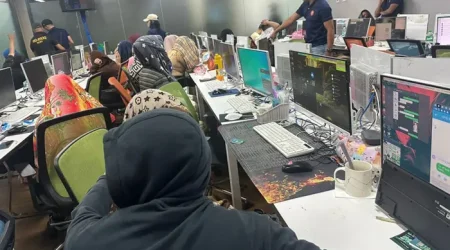In anticipation of the forthcoming Bitcoin (BTC) halving event, thousands of outdated Bitcoin mining machines in the U.S. are being prepared for shipment to destinations abroad.
According to Bloomberg, SunnySide Digital — a wholesaler in the crypto mining industry — is sending approximately 6,000 older Bitcoin mining machines to a warehouse it operates in Colorado Springs.
The company plans to refurbish and resell these machines to buyers overseas, especially in regions with cheaper energy costs.
SunnySide Digital CEO Taras Kulyk said the decision is a natural response to the halving event. Buyers are seeking locations where electricity expenses are minimal. Countries such as Ethiopia, Tanzania, Paraguay, and Uruguay are emerging as key players in the global mining landscape due to their favorable energy costs.
Around 600,000 Antminer S19 series mining rigs, constituting a significant portion of the current Bitcoin mining hardware, will be relocated out of the U.S. — primarily to Africa and South America, Luxor Technology data shows.
Price volatility and equipment upgrades
The halving event, ingrained in Bitcoin’s protocol by its anonymous creator, Satoshi Nakamoto, aims to control the total supply of Bitcoin by reducing the mining reward by half approximately every four years. With the reward set to drop to 3.125 Bitcoin from the current 6.25, miners are under pressure to optimize their operations.
Despite the challenges posed by the halving, Bitcoin’s value has seen significant growth and is currently priced at $65,770, although a few thousand dollars down from its recent all-time high peak of $73,750 attained on March 14.
Analysts like Michael van de Poppe have described this correction as a case of pre-halving peaking and have predicted the cryptocurrency could hit new all-time highs.
However, continued use of outdated equipment could lead to electricity costs outweighing mining revenue, necessitating a shift towards more efficient hardware.
In response to these dynamics, some mining firms are strategically relocating their operations to regions with lower electricity costs. Nuo Xu, a miner with sites in Texas, is exploring opportunities in Ethiopia, Nigeria, and other countries, drawn by the prospect of reduced overhead costs.
While some equipment remains in the U.S. due to logistical and shareholder considerations, many mining companies are investing heavily in new hardware.
Major players in the industry have collectively ordered over $1 billion worth of machines since February 2023, signaling a commitment to adapt to the evolving landscape of Bitcoin mining.
Post Views: 408













Leave a Reply